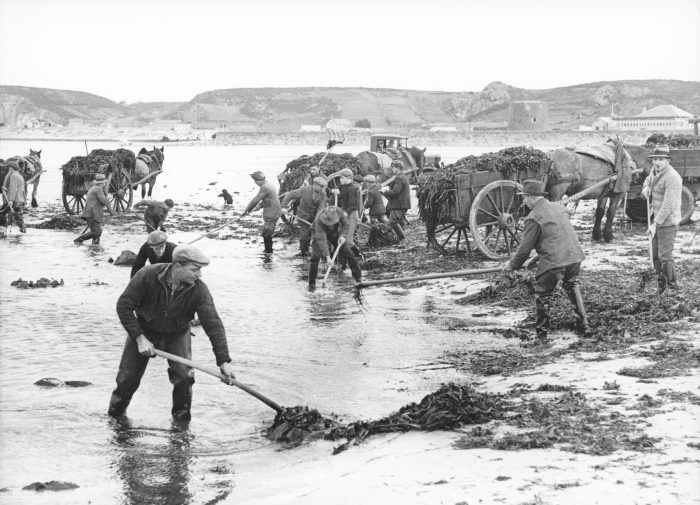
Words matter…and it’s not too late to reclaim the true meaning of ‘the Jersey Way’.
By our guest contributor, the Jersey Evening Post’s former editor, CHRIS BRIGHT.
(This essay, which appeared in the first few days of January 2024 in the JEP, before the election took place for Chief Minister, is republished below, with the JEP’s kind permission)
DOES anyone still make new year resolutions?
If so, here is a modest proposal that could go a long way in 2024 towards restoring Jersey’s sense of unity and self-confidence. It is a simple suggestion, involving just three short yet powerful words and, more particularly, the way in which they are used.
Those three little words are ‘the Jersey Way’, a phrase hijacked and distorted in recent years by individuals determined to twist its meaning from positive to negative.
There used to be no doubt. The Jersey Way was widely acknowledged to be a good thing, a certain outlook and code of conduct developed over centuries that continued to play its part in keeping the Island broadly contented, socially coherent, well run, unique and a bit special.
Then something changed, almost imperceptibly at first but steadily gathering momentum until repeated misuse has misled many into believing instead that the Jersey Way signifies a local problem to be stigmatised and eliminated. Now the old phrase is thoughtlessly bandied about not as a compliment but an insult, usually by critics with an agenda of their own.
Far too readily these days the words ‘the Jersey Way’ will be used to vaguely suggest some kind of tradition of low standards bolstered and protected by nepotism, cover-up and mutual back-scratching.
Unable to process the idea that they have somehow landed up in an English-speaking place that nevertheless is not England, many of the proponents of this tinpot theory believe themselves to be bravely criticising a uniquely insular form of corruption when in reality they are doing far more to undermine the confident sense of identity and civic pride that made Jersey so successful in the past.
If that good fortune is to be passed on to future generations, we will need to find a way past the current slump in communal morale and revive the same kind of self-belief in Jersey’s home-grown abilities that earned a place among the world’s most enviable locations. Resolving to actively challenge the use of snide comments about ‘the Jersey Way’, whether they come from newcomers or established residents, would be a good enough place to start.
This is not merely a matter of semantics or hurt feelings. Words matter. To continue tolerating the steady drip of glib derogatory comments about traditional Island attitudes will just speed up the vicious circle of decline currently affecting so many serious issues, because if Jersey is constantly being told it is unable to manage its own affairs Jersey may eventually come to believe it, shrug its collective shoulders and leave all the decisions to a growing army of technocrats with little understanding of history or regard for the irreplaceable value of human interactions. It has been said that a lie repeated often enough comes to be seen as the truth and that seems to be the dangerous point we are now approaching.
From the state of the once-proud health services to the impossible price of houses, from world-beating electoral apathy to educations disrupted by disaffected teachers, from widespread dismay at an out-of-control civil service with a mania for more and more regulation to the soul-destroying call-centre culture that makes dealing with most organisations these days, public or private, such a comprehensive pain in the brain, there are few situations that couldn’t benefit from a swift application of the Jersey Way…the real one, that is.
What does that mean? Defining the real Jersey Way is as elusive as describing the magic of Jersey in general has famously been. We know it when we see and feel it, perhaps by way of a Blampied etching or a green-and-granite landscape, or a snatch in the soft musicality of Jèrriais overheard at a cattle show, but it is hard to pin down with words.

There are certain characteristics that help to build the picture, however. The Jersey Way combines qualities of common sense, independence, pragmatism, prudence, public spiritedness, empathy, integrity and optimism. It follows that the Jersey Way, on the whole, exists in opposition to bureaucracy, waste, ostentation, inflexibility and grandiosity.
The real Jersey Way does not rush to judgment but takes its time to think things through in the light of past experience. Its word and a handshake generally suffice.
It is plain-speaking, shunning the word-cloud of euphemism and jargon with which today’s political and corporate classes attempt to communicate. Crucially, it is more concerned with results than with processes and procedures.
These instincts are deeply rooted in the rural history where the true heart and soul of Jersey still resides, albeit under many recent layers of modernity. They were created by the slow procession of time through dozens of generations and hundreds of seasons and they developed through the weaving of a complex web of family, work, church, school and parish, all coloured by lifetimes of shared memories.

Detractors will claim that such a history must mean a tendency towards shared secrets as well, blind eyes turned, nods and winks, secret signs and shibboleths designed to exclude outsiders and newcomers. Nothing could be further from the truth. Jersey has always welcomed strangers and newcomers, provided they are willing to return the compliment. In fact, an early appreciation of its quirks and customs, rather than knee-jerk hostility to the unfamiliar, is probably the best way to start settling in.
Evidence of the welcome mat is everywhere you look, from the tapestry of national backgrounds that makes up Jersey’s unique population mix to the largely unrestricted immigration which has seen that population almost double in size within some of our lifetimes. That is just one of the reasons why the recent rush to stigmatise ‘the Jersey Way’ is so annoying as well as so unfair. More importantly, this malign desire to reverse-engineer the meaning of words is ultimately a danger to our basic freedoms, touching as it does on the sinister worlds of Orwellian Newspeak and Trumpian ‘alternative facts’.
It may even be that Islanders have been too tolerant of such uninformed criticism, allowing the calumny to take hold because of the unwarranted inferiority complex of a small place, or perhaps just over-politeness.
None of this is to say that Jersey’s history of independent action and freedom to choose its own path has not caused its share of problems or that nothing can be improved. Of course it can. To suggest, however, that there is something uniquely Jersey about deficiencies in, for example, standards of institutional care, law enforcement or government spending oversight is a reckless misrepresentation.
A new year, with many well-documented challenges ahead, is an opportunity to renew opposition to this damaging trend. To his great credit, the former Bailiff (and therefore chief citizen), Sir William Bailhache, stepped up to denounce it some years ago, urging Islanders to reclaim the true meaning of ‘the Jersey Way’.
It is fair to say that Sir William’s intervention had limited impact but the fact remains, and bears repetition, that words matter. That point, at least, should not be lost on the social justice warriors, online trolls, virtue signallers, political correctness zealots, merchants of victimhood and conspiracy theorists who devote vast amounts of energy to policing the language of others yet tend also to be the culprits in this case, thus adding rank hypocrisy to bad manners. Let them try similarly denigrating, say, ‘the English Way’, or ‘the Madeiran Way’, or ‘the Transcarpathian-Ruthenian Way’ and see what happens.
As 2024 begins, those inclined to use the term as an insult might reflect on Sir William’s wisdom and resolve to stop and think before they speak. Those who already understand it as a time-honoured compliment could equally resolve to make a point of using it that way whenever the opportunity arises and to challenge its abuse when they witness it, just as we are now encouraged to challenge casual racist or sexist comments.
Few would dispute that most of Jersey’s political and social problems would benefit from a lot less bureaucracy and a lot more common sense, the very quality at the heart of the real Jersey Way. The parish hall inquiry system, which deals effectively with minor miscreants but spares them a life-spoiling court conviction, is a good example of common sense in action. Filter in Turn might be cited as another. And, argue as much as you like over the principles, but there is no doubt that politics worked better in practice under the old system of dedicated, consensual States committees, with their inbuilt checks, balances and communal wisdom.
Just why that functioned so well in the particular circumstances of this tiny, unique jurisdiction is a question definitively analysed over half a century ago by the late statesman and lawyer Ralph Vibert in his masterly essay, Parliament without Parties, which is probably still available from some deep and dusty drawer in the States Greffe.
Today’s widespread discontent with officialdom is a direct result of allowing such manifestations of the elusive Jersey Way to be sneered at and progressively eliminated, with the parish system the latest to find itself in the cross-hairs in the name of electoral reform. Among the good reasons to try belatedly to stem the tide is that a combination of insular independence of mind and good old common sense is about the only bulwark in prospect against the creeping authoritarianism that now affects every aspect of Island life.
Now a regular commentator on civil liberties, Lord Sumption, a retired judge of both the UK Supreme Court and, as it happens, the Jersey Court of Appeal, has made the point that the age-old presumption that citizens may freely do anything not expressly forbidden by regulation is in danger of being turned on its head by exactly this kind of post-Covid, post-Brexit over-reach. It is a warning as relevant here as anywhere in Britain, but we at least still have the remains of a more liberal tradition to rekindle if we so choose.
The current powers-that-be can play their part too by requiring any public employees tempted to refer derisively to ‘the Jersey Way’ to explain in detail how they justify doing so, which should help enormously. It would be perverse of the authorities to invest so much time and so many stirring words in the current project to establish Jersey’s international identity without also systematically standing up for what lies behind it.
There is a little over two years to go before the next States elections. With the balance of power currently in a state of flux, it is perhaps not too fanciful to hope that the victors will be those who can most thoughtfully articulate ‘the Jersey Way’ (by chance a handy three-word slogan of the kind so beloved by spin-doctors and political campaigners) and engineer a swift and happy return to its time-tested values.






One Response
Hear! Hear!
Extremely well said Chris.